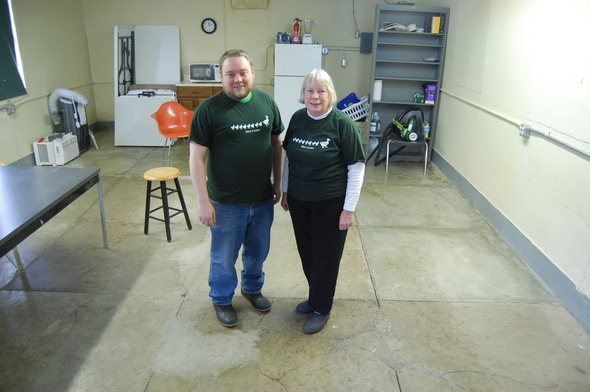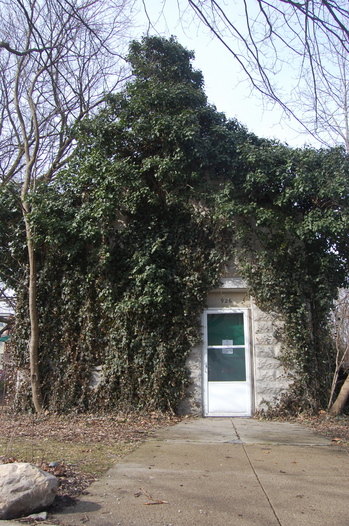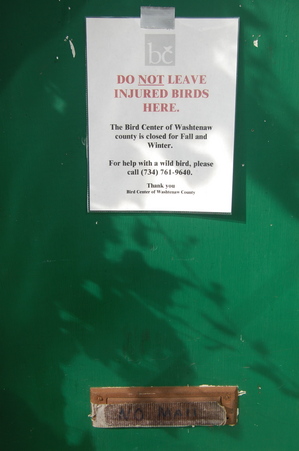Winging it: After 7 years at timeworn polling place, Bird Center of Washtenaw County looks for new nest

Carol R. Akerlof, founder and director, and T. Will O'Neill, clinic director, stand inside the Bird Center of Washtenaw County. The building is located on Mary Street in the heart of University of Michigan student housing.
Janet Miller | For AnnArbor.com
When the Bird Center of Washtenaw County received a call three weeks ago about an injured and emaciated great blue heron, the bird was temporarily lodged in Carol Akerlof’s downstairs shower.
And now, she would like to have her shower back.
The Bird Center has rescued and rehabilitated thousands of injured and diseased birds since it opened in 2005 in a timeworn polling station on Mary Street owned by the city of Ann Arbor. But the time has come for the nonprofit to look for a new location, said Akerlof, the center’s founder and unpaid director.

While the Bird Center occupies the early 20th century city polling place rent-free, there are numerous issues, but finding a new location at a price the nonprofit can afford is a challenge.
Janet Miller | For AnnArbor.com
Between September and March, the birds are taken to Akerlof’s house. Last year, she housed 17 birds during the off season. “I know that sounds like it would be easy, but many of the birds needed medicine and there’s a lot of wear and tear on the house because there have been a lot of volunteers in and out.”
There are other issues: The 700-square-foot polling place is a single room, making it impossible to sequester contagious birds. It’s cramped, requiring recovering birds to be housed in too-close quarters, a situation that can cause the spread of parasites and disease. There can be up to 130 birds inside the center at a time during the summer. And the building floods (it’s stocked with sandbags) and there’s mold. And there’s no space for larger birds such as great blue herons.
There are two roadblocks: funding and finding a landlord willing to rent.
While the Bird Center operates on a $90,000 annual budget, there is little left for rent. The city allows the center to use the polling place free of rent, with the understanding that the center keep up the building. It is still used for voting.
Most of the budget - all from private donors and foundations, and none from governmental units, O’Neill said - covers staff costs. Interns are paid minimum wage and supervisors such as O’Neill are paid slightly more. All work part time. The of the funds cover utility costs, medicine and medical care. And while there is no public money, they offer a public service, O’Neill said, fielding hundreds of calls about everything from injured or diseased birds to health issues such as avian flu.
Akerlof thought she’d found a new home for the center when she toured a vacant building on the grounds behind the Washtenaw County Recreation Center at Washtenaw Avenue and Platt Road that was formerly used as part of the Juvenile Detention Program. It was spacious, centrally located, had ample parking and was on a bus line. There also was the bonus of being able to release the birds in adjacent County Farm Park, O’Neill said.
But an area architect who had volunteered to access the building said that it wasn’t salvageable. It would have to be torn down and new construction erected. That, Akerlof said, is financially unrealistic.

A sign on the door during the fall and winter months.
Janet Miller | For AnnArbor.com
In the short term, Akerlof said she’d like to find a landlord willing to rent space at a below market rate or rent-free. Longer-term, she said, she'd like the Bird Center to mount a capital campaign to raise funds for a building of its own. “But I don’t want to stress out our donors unless we have a place in mind that’s a possibility,” Akerlof said.
At the same time, the Bird Center became the first group in Michigan to use a new online database for entering wildlife records called WILD-ONe, offered free of charge by the Wildlife Center of Virginia. The system records the location of where birds and other wildlife are found and will be able to detect emerging diseases such a west Nile Virus and even health issues such as toxic dumping or bioterrorism. If, for instance, three ducks were found dead along different points of the Huron River, the database would be a red flag.
“It could be a tipoff that there is pollution we otherwise wouldn’t have detected,” Akerlof said. “If sick birds start appearing, we’re the ones who are going to see them.”
The Bird Center rescues and treats between 800 and 900 birds a year representing 65 species, from humming birds to sandhill cranes. If a bird cannot be rehabilitated or placed in a zoo or educational facility, it must be euthanized. While the center offers emergency care to all wild birds, it only rehabilitates songbirds. Raptors are taken elsewhere, such as the Howell Nature Center. The Bird Center is licensed by the Department of Natural Resources and the U.S. Fish and Wildlife Service.
While spring and summer are the busy seasons, the center fields calls year-round. This winter they responded to a juvenile trumpeter swan that had been shot neat Parker and Scio Church roads west of Ann Arbor and a sandhill crane with a shattered wing. Neither bird survived.
The Bird Center will hold a fundraiser dinner April 28 at Weber’s Inn and hosts volunteer training April 14. Go to http://www.birdcenterwashtenaw.org/index.html for more information.


Comments
Joe_Citizen
Sat, Feb 25, 2012 : 8:38 p.m.
I believe they pay a major role in our community and need be respected as such an entity. They need to be funded by someone, like the city and county, for they may one day save us from communicable sicknesses.
jns131
Sat, Feb 25, 2012 : 4:26 p.m.
I use to take injured birds out to a place on Textile Road. This is a place HS told me to take them to. Wonder if that lady is still taking in birds there as well. Interesting article. Never knew there was place like this for the birds. I wish her well on finding a new place.
mkm17
Sat, Feb 25, 2012 : 8:03 p.m.
The place near Textile is most likely the place that cares for waterfowl, Mallard Marsh.
81wolverine
Sat, Feb 25, 2012 : 1:38 p.m.
I've been in that Mary St. building and it's really inadequate for what the group does there. Carol is really a saint for spending so much time helping these injured birds with no compensation. A permanent location would be a Godsend for the Bird Center.
A2comments
Sat, Feb 25, 2012 : 12:46 p.m.
I can see how "tunding" would be a roadblock...
arborani
Sat, Feb 25, 2012 : 4:35 p.m.
Needless pettifoggery - the typo is already corrected. Instead, consider something positive: donating or volunteering with Carol's community gem, which is working miracles on a shoestring.